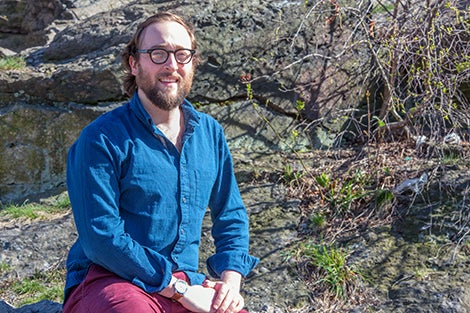April 28, 2016 — Growing up in Montana, Hank Rosen became aware at a young age of the small sliver of circumstance that can separate a healthy and an unhealthy life. He made countless visits to the legislative chambers where his mother spent years as a lawmaker trying to improve health insurance coverage. He also traversed the state to visit isolated communities with his physician father. Later, in his own work, Rosen observed the challenges that people with a criminal record can face in the health care system.
Now, about to graduate with a master of science degree in health policy and management from Harvard T.H. Chan School of Public Health, Rosen is eager for the opportunity to tackle health inequity at its roots. He hopes to eventually return to Montana to work on improving health care access and quality for the state’s poorest residents.
“Poor health is a symptom of poor public policy,” Rosen said. “I think public health provides the best lens for looking at the broader systems in this country that can be exclusionary and unjust. For example, a public health practitioner would never assume that a person became involved in the criminal justice system because they are simply a bad person. They would take a step back and look at the community this individual came from, the resources they had for education and job opportunities, their health needs, and the laws in place.”
Prior to enrolling at Harvard Chan in 2014, Rosen worked as a policy analyst for the Council of State Governments Justice Center in New York City on a multimillion-dollar Justice Department-funded project focused on effective criminal justice policies and practices. The job was a detour from his plan to pursue a doctorate in psychology, but having graduated in 2009 with a liberal arts degree, Rosen was delighted to have any job, he said. And he soon found that policy work piqued his interests.
Rosen managed a portfolio of federal grantees, including state and local departments of corrections and non-profits, and tried to help them figure out how to make the most of their small awards. The grants funded initiatives like an anger management class at a prison—important work, but Rosen longed to be part of something on a larger scale.
“I got frustrated with this piecemeal approach,” he said. “I wanted to learn how to develop policies that would really affect change.”
Rosen threw himself into his studies at Harvard Chan, learning the nuts and bolts of the U.S. health care system, how to craft policies with politics in mind, and how to build mission-driven goals into an organizational budget. The courses provided him with a strong foundation for the practicum projects—real-world public health experiences required in some degree programs at the School—that he participated in during his second year. Since enrolling at Harvard Chan, he has worked with the Massachusetts Health Policy Commission on projects including an opioid use reduction initiative, and with Boston Children’s Hospital on an initiative to reduce variability and waste in billing processes. “I was able to approach these experiences in a more effective way because of the preparation I had,” Rosen said.
A class on theories of disease distribution taught by Nancy Krieger, professor of social epidemiology, made a big impact on the way that Rosen thinks about health policy. “Her class really dispelled the notion that health is solely a matter of personal choice. That idea clicked with me and my perception of what was happening in the criminal justice system.”
Rosen doesn’t know yet where he’s going to land yet after graduation, but he’s looking at positions that offer the opportunity to impact policy. Whether it’s in a government office or a health care provider, Rosen’s greatest requirement is that the organization be open to efforts to improve health equity. “I need to work somewhere that is aligned with what I believe to be just,” he said.
Photo: Sarah Sholes
